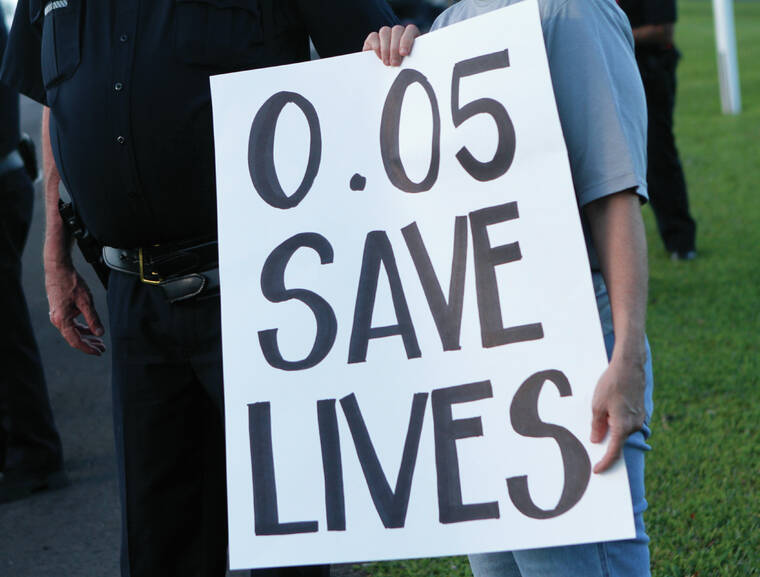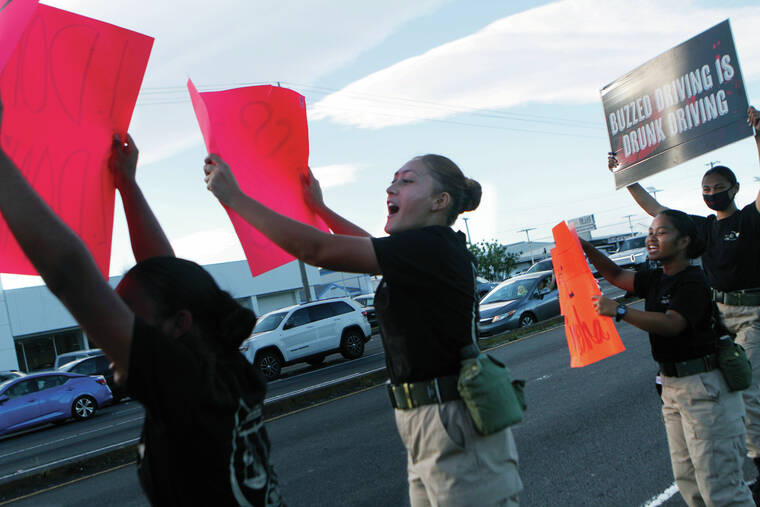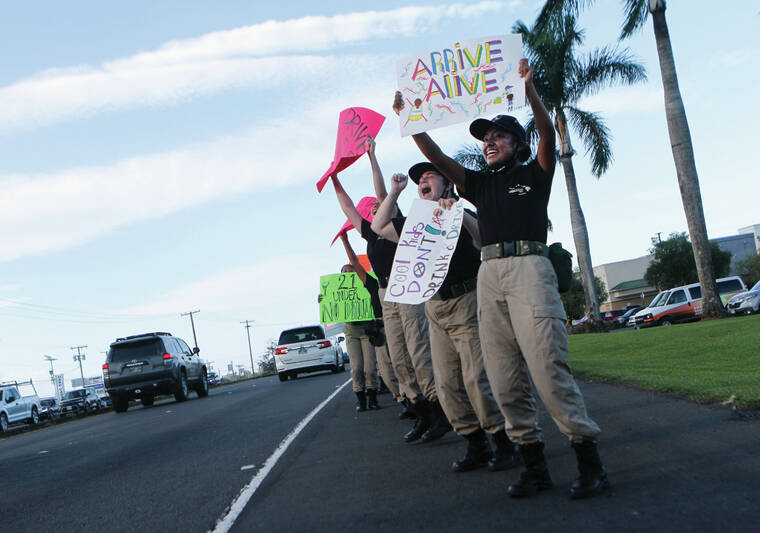Hawaii could become the second state to lower the legal blood alcohol concentration, or BAC threshold, from 0.08% to 0.05% for those operating a vehicle.
Senate Bill 160 was passed by the Senate on March 3 and crossed over to the House, where it cleared its first reading on Tuesday.
On Wednesday, a group of roughly 50 individuals including members of the Hawaii Police Department, the Youth Challenge Academy, school crossing guards, students and people in recovery met for a sign-waving in Hilo to support the bill.
“Across the state, we’ve had really good community-level support,” said Sally Ancheta, East Hawaii Drug Free Coalition coordinator, who helped organize the event. “This bill is just about changing behaviors and helping people be more aware that they are impaired even at 0.05%.”
A 2022 survey from SMS Research found that more than 60% of Hawaii voters supported lowering the BAC limit to 0.05%.
“This really isn’t about not drinking,” Ancheta said. “That 0.05% is not one drink. For women, it’s up to three drinks within a two-hour period, and for men, it could be four or more drinks within the same time depending on their weight and what they’ve eaten.”
But pushback regarding the bill came from local breweries throughout the state.
“A blood alcohol content of 0.05% would be very difficult to discern for bartenders and servers, who ultimately have a legal obligation to not over-serve,” said testimony from Justin Guerber, head brewer at Kauai Beer Company. “Research seems to indicate that a majority of drunk driving related fatalities involve at least one driver with blood alcohol content of 0.15% or higher. Lowering the limit from 0.08% to 0.05% would not fix this problem.”
Additional concerns came from the state Public Defender’s Office, citing increased court congestion and a burden on local law enforcement if the bill is approved.
“This proposed law will result in a significantly higher workload for an already overburdened police department and legal system,” the testimony said. “In order to deal with the increased cases, the Legislature will need to build additional courtrooms and hire more judges, prosecutors and public defenders.”
The only no vote came from Sen. Donna Mercado Kim, a Democrat from Oahu, who did not respond to a request for comment.
“Her only objection was that she’s small in stature and she feels like if she had one glass of wine it would put her over 0.05%,” said Ancheta, who attended the Senate vote. “Everybody’s metabolism is different, and it depends on the size of the glass of wine, and if they have other medications or other issues, but I think that’s a misconception that people have about this bill.”
From Feb. 27 to March 5, Hawaii Island police arrested 30 motorists for driving under the influence of an intoxicant, nine of which were involved in a traffic accident.
The Hawaii Police Department’s Traffic Services Section also found that 166 major crashes occurred so far this year, an increase of nearly 28% compared to the same period last year.
“The goal is to save lives,” said Sen. Gilbert Keith-Agaran, a Democrat from Maui, who introduced the bill. “The National Transportation Safety Board recommended this reduction over 10 years ago, and while over a hundred countries have set 0.05% as the blood alcohol content limit, only Utah has adopted it so far.”
Utah was the first state to pass legislation lowering the threshold to 0.05% back in 2018. In the 21 months after approval, Utah had a 19.8% drop in fatal car crashes while reporting no major spikes in arrests or negative impacts on alcohol sales, tourism and tax revenues.
Washington, North Carolina, Connecticut and New York are attempting similar legislation this year, and several countries already have lowered the limit to 0.05%, including France, Italy and Germany. Countries like Japan, Sweden and Russia have set the limit even lower at 0.02%.
Ancheta is optimistic the bill will also pass a House vote.
“We have support from Rep. (David) Tarnas to have the bill heard in the Judiciary (committee), and we just hope he continues to support this policy,” she said. “On the House side, we have great support from our Hawaii Island lawmakers, as well as the rest across the state.”
If approved, the bill will make its way to Gov. Josh Green, who indicated he would support the measure, which would take effect immediately upon his signature.
“I think we should tighten our drunk driving rules down to blood alcohol 0.05%,” Green said during a livestream interview last month. “That’s really helped to save lives all across the planet.”
Email Grant Phillips at gphillips@hawaiitribune-herald.com











